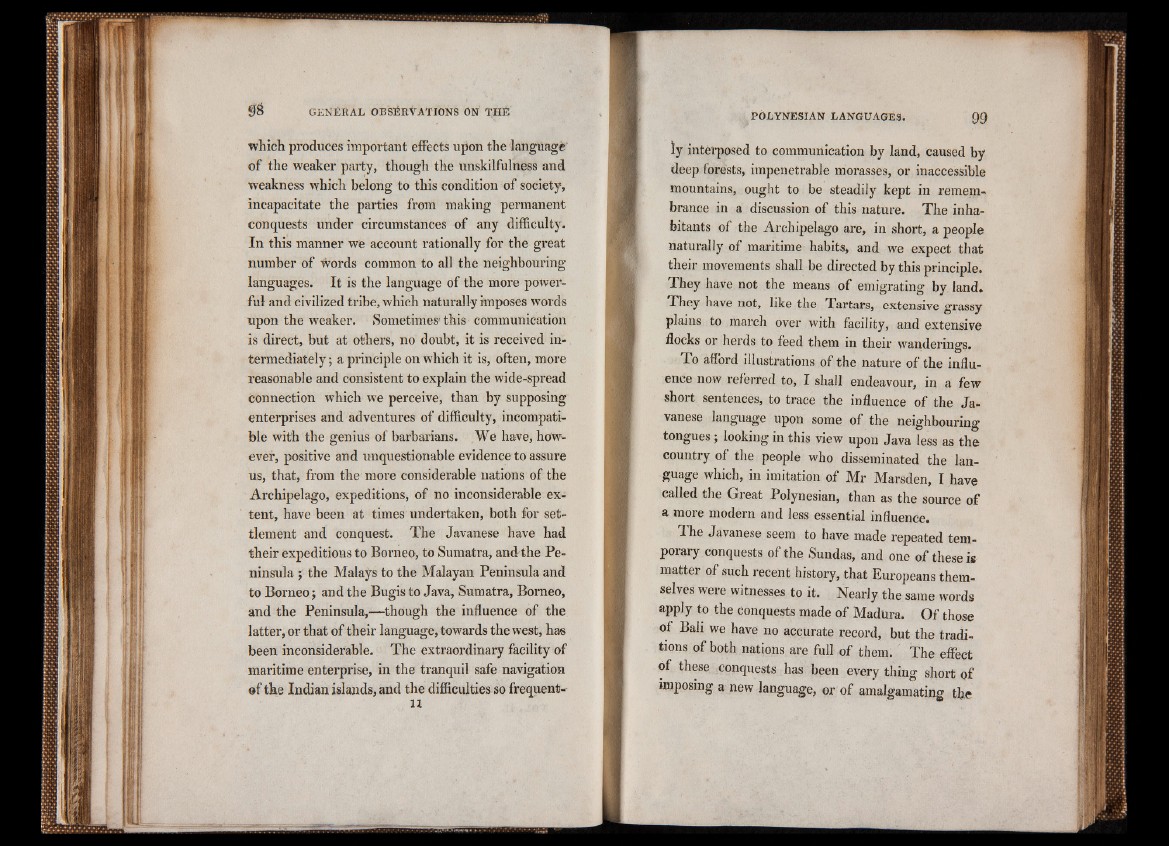
tvhich produces important effects upon the language
of the weaker party, though the unskilfulness and
weakness which belong to this condition of society,
incapacitate the parties from making permanent
conquests under circumstances of any difficulty.
In this manner we account rationally for the great
number of words common to all the neighbouring
languages. It is the language of the more powerful
and civilized tribe, which naturally imposes words
upon the weaker. Sometimes1 this communication
is direct, but at others, no doubt, it is received intermediately
; a principle on which it is, often, more
reasonable and consistent to explain the wide-spread
connection which we perceive, than by supposing
enterprises and adventures of difficulty, incompatible
with the genius of barbarians. We have, however,
positive and unquestionable evidence to assure
us, that, from the more considerable nations of the
Archipelago, expeditions, of no inconsiderable extent,
have been at times undertaken, both for settlement
and conquest. The Javanese have had
their expeditions to Borneo, to Sumatra, and the Peninsula
j the Malays to the Malayan Peninsula and
to Borneo ; and the Bugis to Java, Sumatra, Borneo,
and the Peninsula,—though the influence of the
latter, or that of their language, towards the west, has
been inconsiderable. The extraordinary facility of
maritime enterprise, in the tranquil safe navigation
of the Indian islands, and the difficulties so frequents 11
ly interposed to communication by land, caused by
deep forests, impenetrable morasses, or inaccessible
mountains, ought to be steadily kept in remembrance
in a discussion of this nature. The inhabitants
of the Archipelago are, in short, a people
naturally of maritime habits, and we expect that
their movements shall be directed by this principle.
They have not the means of emigrating by land.
They have not, like the Tartars, extensive grassy
plains to march over with facility, and extensive
flocks or herds to feed them in their wanderings.
To afford illustrations of the nature of the influence
now referred to, I shall endeavour, in a few
short sentences, to trace the influence of the Javanese
language upon some of the neighbouring
tongues ; looking in this view upon Java less as the
country of the people who disseminated the language
which, in imitation of Mr Marsden, I have
called the Great Polynesian, than as the source of
a more modern and less essential influence.
The Javanese seem to have made repeated temporary
conquests of the Sundas, and one of these is
matter of such recent history, that Europeans themselves
were witnesses to it. Nearly the same words
apply to the conquests made of Madura. Of those
of Bah we have no accurate record, but the traditions
of both nations are full of them. The effect
of these conquests has been every thing short of
imposing a new language, or of amalgamating the